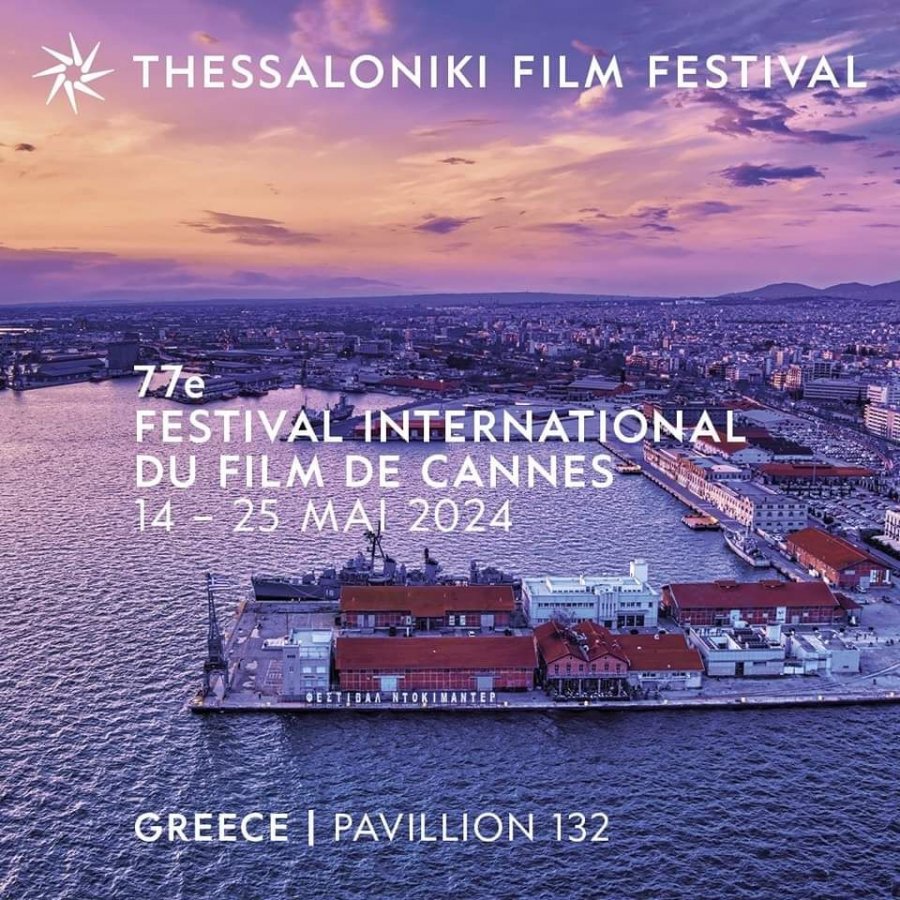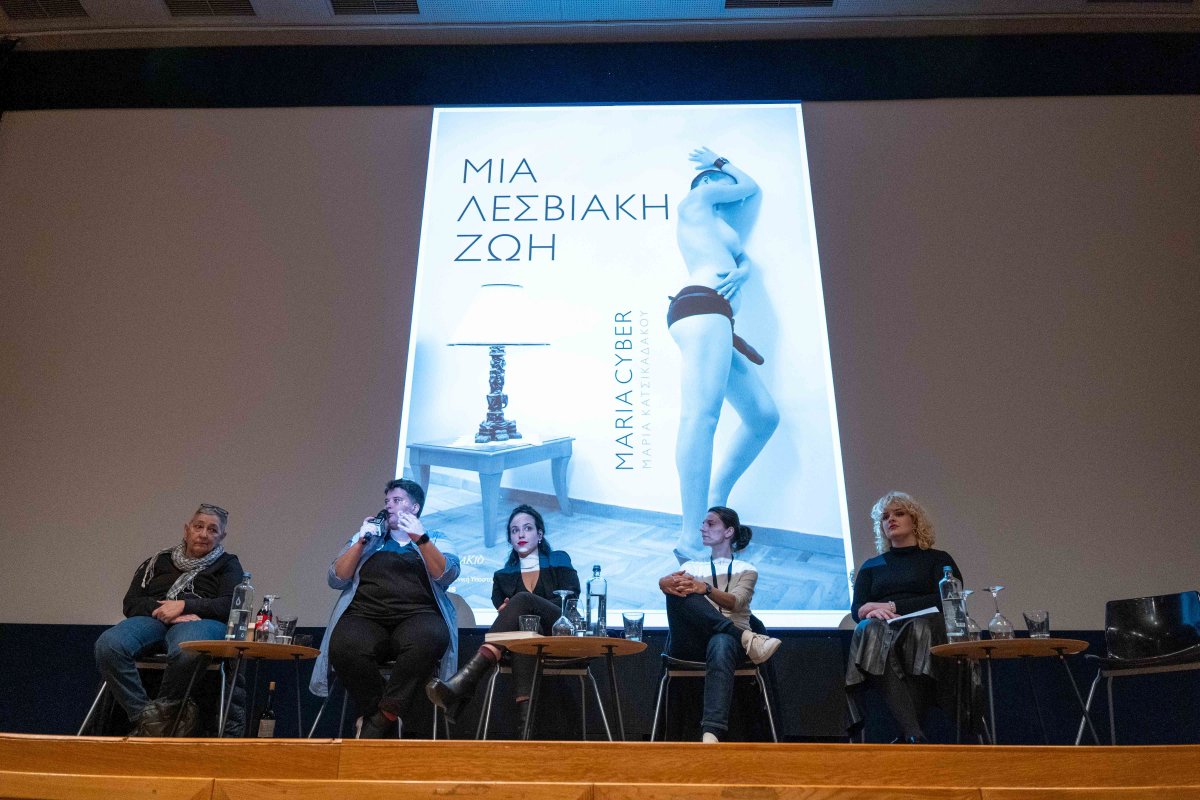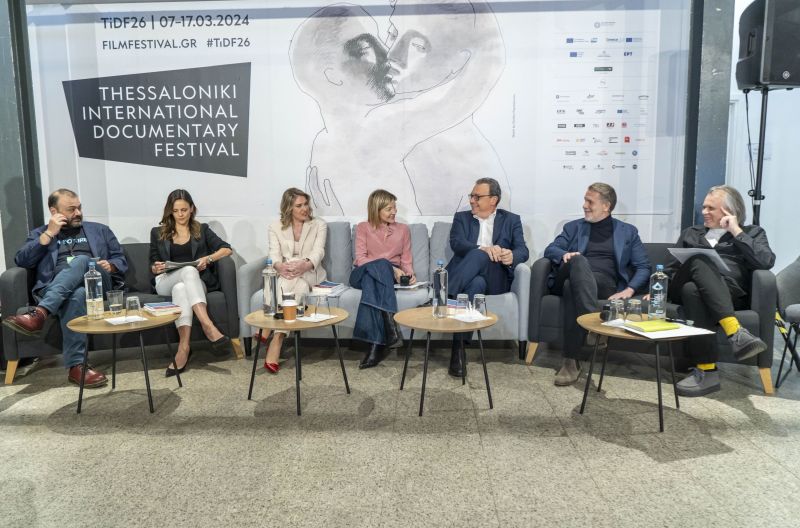The curtain dropped on Thessaloniki’s 50th Film Festival on Sunday, November 22, with a lustrous closing ceremony at Olympion Theatre. The audience, moved and enthusiastic, celebrated the Festival’s jubilee and renewed its date with TIFF for 2010.
The ceremony was presented by actor Christos Loulis, who welcomed the audience and the official guests, inviting them to a three-dimensional cinematic journey, which aimed at giving an answer to the question posed by this year’s festival: “Why cinema now?” Famous ending scenes from legendary films, together with historic moments form the world of motion pictures, paraded at the Olympion Theatre.
In her speech, TIFF Director Despina Mouzaki, visibly moved, said that she had gained great joy and satisfaction at the helm of TIFF, being in charge of one of the liveliest and most anti-conventional institutions in the country. “I am happy because the bet has been won. Thessaloniki’s Film Festival is an authoritative, open and extroversive festival of the arts and beyond. Whatever the Festival has accomplished, it has accomplished through smooth developments, avoiding ruptures. Its creative evolution during its international period shows there is still room for improvement. I am happy for the fact that all those years, TIFF proved to be a living organism, ever responsive to the messages of technological and social developments”, stressed Ms Mouzaki. “I have always believed and still believe that the work of cinema professionals requires freedom, and freedom means innovation, art and risk taking. I sympathise with the agonies of our friends who are not with us this year, abstaining from the Festival. We share their agony for the present and future of the cinema, the agony for its survival and communication with audiences, of rewarding the best it has to offer. TIFF joins its voice with the voices of our colleagues, who chose an alternative way to make the same demands. We want a new cinema law and we expect that the state will fulfil its promises”, said Mrs Mouzaki, adding: “I am satisfied that, together with Georges Corraface, we have succeeded in making the Festival a competitive, innovative and ever evolving institution. A calm power that keeps on developing. We opted for extroversion ratter than introversion”. Ms Mouzaki also stressed that the longevity of the Festival in the following 50 years depends on viewers, who give meaning to the films, on Thessaloniki’s society, which loves the Festival and gives colour and character to Greek cinema, on the state and the sponsors that support the Festival, on film critics and on the staff and volunteers who make TIFF a success. “Above all, we are grateful to the filmmakers and artists, editors and producers, all the people who contribute in this fabulous fairytale of movies. We are 50 years old, and ready to foray into the future”.
The Greek Film Critics Association (GFCA) presented the first award. GFCA president Andreas Tyros symbolically presented the award to Circle B’ of the Society for Macedonian Studies. “The GFCA notes that this is the fourth year running, that there is no ground to present an award to the best Greek picture screened at Thessaloniki’s Festival. Unfortunately, the celebrations for the Festival’s Jubilee do not coincide with a celebration of Greek cinema in general. Although we feel vindicated for suggesting the internationalisation of the Festival, we cannot feel any joy, because, despite the fact that we duly expressed our disagreement regarding the State Awards’ selection process, we were not heard – and now this is the result. We want to say this in the clearest of terms: We say “yes” to Thessaloniki and its relationship of support and trust with the Festival and the Greek cinema in general. This is why, setting right an omission in this year’s Festival, we honour an inseparable part of the history of the institution, by symbolically presenting our award to Circle B’, an oasis of freedom and value seeking in hard times, before degenerating and declining”.
Stage and costume designer Dimitra Labretsa presented the Technical Excellence award of the Greek Union of Film and Audiovisual Technicians to Calin Peter Netzer’s “Medal of Honour”. In his acceptance speech, the filmmaker noted that “the award does not belong solely to me, but also to my actors and collaborators”
The head of Public Relations and Company Communication of Athenian Brewery SA, Menas Mavrikakis, took the floor next, to present the Fischer public choice awards. The award, which is accompanied by a cash prize of 3,000 euros, for a film in the Balkan Survey section went to Goran Paskaljevic’ “Honeymoons”. The FISCHER public choice award for a film in the DigitalWave section, which is accompanied by a cash prize of 3,000 euros, went to “Elvis’ Last Song” by Vassilis Raissis. The public choice award for a film in the Greek section, accompanied by a cash prize of 4,000 euros, went to Sophia Papahristou’ “Biloba”. Finally, the public choice award for a film in the International Competition section, accompanied by a cash prize of 4,000 euros, was presented to the movie “Ajami” by Scandar Copti and Yaron Shani.
The impressive “invasion” of the Lindy Hop Greece dance group interrupted the award ceremony and filled Olympion with colour, joy and dancing. The audience watched in awe and actively participated in the swing choreography of the group, which enacted a scene from the film “Swing Kids”. This unexpected dancing interval came to a close with the appearance of two “German” police officers of the 1920s, who drove the “naughty” swingers out, receiving the generous applause of the audience.
Thessaloniki’s mayor Vassilis Papageorgopoulos presented next the “Cinema and the City” award, accompanied by a cash prize of 15,000 euros, to “Blood and Rain” by Jorge Navas. Mr Papageorgopoulos stressed that TIFF emerged victorious from the crisis.
Ifigeneia Taxopoulou, cultural advisor to the Chairman of the Greek Parliament, presented the “Human Values” award, which is accompanied by a cash prize of 15,000 euros, to “Lebanon” by Samuel Maoz. “On behalf of the Parliament’s Chairman, Mr. Filippos Petsalnikos, I wish the Festival to lead a long and successful life. This is the fifth consecutive year that the Parliament’s TV Channel is presenting this award to a foreign, independently produced film participating in TIFF’s “Independence Days”. This year’s winner is a film that succeeds, with a minimalist narration – in terms of space, time and actors- to fully capture the horrors of war”, said Mrs Taxopoulou. In his acceptance speech, the filmmaker confessed that all that he expected to go home with was the audience’s warm response to his film – which was indeed forthcoming - adding that he was pleasantly surprised by the award.
The Jury president of the International Federation of Film Critics (FIPRESCI) Roland Bergan presented the next awards. The award for a film in the International Competition Section went to “Medal of Honour”. The award for a film in the Greek Films 2009 section went to “O Diahiristis” by Periklis Hoursoglou. “We are the ones presenting the most important awards, since by definition, the critics are paid to tell you which film is good and which isn’t”, said Jensen jokingly, adding: “We watched 21 films, 8 of which were Greek. It is a shame we didn’t have the opportunity to watch a more representative sample of Greek cinema”. Mr Netzer thanked the jury and stressed that he always wanted to get the coveted FIPRESCI award. Taking the floor, Periklis Hoursoglou dedicated the award to his family and particularly to his father: “Thank goodness there are foreign jurors as well. The Greek film critics used harsh words, but I am confident that obstacles will only make us better”.
A short “Making Of” video of the 50th TIFF was screened next, in which participating artists and filmmakers gave their own answers to the “Why cinema now?” question.
Christos Loulis then invited the members of the Jury to present the International Competition Section awards. Director Lav Diaz presented special citations to actress Katharina Schuttler for “The Day Will Come” by Susanne Schneider and to Ralston Jover’s “Bakal Boys” for its screenplay and theme.
Production Designer Eugenio Caballero presented the Artistic Achievement award to “Missing Person” by Lee Seo. Lissy Bellaiche, sales agent for the I/S Danish Film Producers, presented the Best Screenplay award ex aequo to Scandar Copti and Yaron Shani for their film “Ajami” and to Tudor Voican for “Medal of honour”.
Actress Mirjana Karanovic presented the Best Actor award to Victor Rebengiuc (“Medal of Honor”). Director Gyorgi Palfi presented the Best Actress award to Ruth Nirere who stars in Philippe van Leeuw’s “The Day God Walked Away”. Director Amos Poe presented the Best Director award to Rigoberto Perezcano for his film “Northless”.
Next, producer Jeremy Thomas presented the Special Jury Award - Silver Alexander, which is accompanied by a cash prize of 25,000 euros, to Calin Peter Netzer’s “Medal of Honour”.
Finally, director Werner Herzog, this year’s guest of honour in TIFF, presented the Best Feature Film award - Golden Alexander, which is accompanied by a cash prize of 40,000 euros, to the film “Ajami” by Scandar Copti and Yaron Shani.
After the final award was presented, all winners came on stage, together with TIFF president Georges Corraface and director Despina Mouzaki, for a commemorative picture, celebrating TIFF’s jubilee.
Shortly before the curtain dropped on TIFF, the leading actress in Alain Resnais’ “Wild Grass”, which was the closing film of the ceremony and the Festival, came on stage and took the audience by surprise, taking her jacket off and promising that what comes next in the film would be even more interesting.















